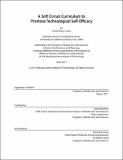| dc.contributor.advisor | Leah Buechley. | en_US |
| dc.contributor.author | Lovell, Emily Marie | en_US |
| dc.contributor.other | Massachusetts Institute of Technology. Dept. of Architecture. Program in Media Arts and Sciences. | en_US |
| dc.date.accessioned | 2011-12-19T20:57:30Z | |
| dc.date.available | 2011-12-19T20:57:30Z | |
| dc.date.copyright | 2011 | en_US |
| dc.date.issued | 2011 | en_US |
| dc.identifier.uri | http://hdl.handle.net/1721.1/67826 | |
| dc.description | Thesis (S.M.)--Massachusetts Institute of Technology, School of Architecture and Planning, Program in Media Arts and Sciences, 2011. | en_US |
| dc.description | This electronic version was submitted by the student author. The certified thesis is available in the Institute Archives and Special Collections. | en_US |
| dc.description | Cataloged from PDF version of thesis. | en_US |
| dc.description | Includes bibliographical references (p. 35-36). | en_US |
| dc.description.abstract | The development of technological self-efficacy in young people can have a dramatic impact on diversity in the field of computing. Students'self-efficacy and scientific understanding can benefit from engaging in hands-on activities, such as creating soft, electronic textile (e-textile) circuits. There is, however, a notable lack of instructional materials to support such learning experiences. I have developed a workshop facilitation guide which outlines five e-textile activities, accompanied by a collection of low-cost craft and electronic components. The instructional materials target educators, who may facilitate e-textile activities in settings such as science museums, after-school programs, or summer camps. I have assessed the effectiveness and usability of the materials through a short series of workshops, during which I also evaluated their impact on students'technological self-efficacy. | en_US |
| dc.description.statementofresponsibility | by Emily Marie Lovell. | en_US |
| dc.format.extent | 70 p. | en_US |
| dc.language.iso | eng | en_US |
| dc.publisher | Massachusetts Institute of Technology | en_US |
| dc.rights | M.I.T. theses are protected by
copyright. They may be viewed from this source for any purpose, but
reproduction or distribution in any format is prohibited without written
permission. See provided URL for inquiries about permission. | en_US |
| dc.rights.uri | http://dspace.mit.edu/handle/1721.1/7582 | en_US |
| dc.subject | Architecture. Program in Media Arts and Sciences. | en_US |
| dc.title | A soft circuit curriculum to promote technological self-efficacy | en_US |
| dc.type | Thesis | en_US |
| dc.description.degree | S.M. | en_US |
| dc.contributor.department | Program in Media Arts and Sciences (Massachusetts Institute of Technology) | |
| dc.identifier.oclc | 767585104 | en_US |
